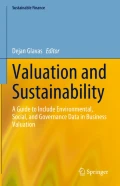
This guide was original created by Erik Sonne
At the moment you find 100s of ESG data providers according to Sustainability.
These include well-known providers with global coverage such as
and specialized data providers such as
Despite the valuable contributions, these data providers have made in advancing ESG investing globally, it’s important to understand the inherent limitations of this data, as well as the challenges of relying on any one provider.
Datarade: a source to find ESG data providers.
Rate the Raters 2020: Investor Survey and Interview Results: This report shares insights from 17 in-depth interviews with investors, supplemented by a survey of 25 investors, highlighting their views on current ESG ratings and how they use these ratings to evaluate ESG topics
ESG Reports and Ratings: What They Are, Why They Matter: This article helpfully reviews various ESG rating services.: (i) Bloomberg ESG Data Service; (ii) Corporate Knights Global 100; (iii) DowJones Sustainability Index (DJSI); (iv) Institutional Shareholder Services (ISS); (v) MSCI ESG Research; (vi) RepRisk; (vii) Sustainalytics Company ESG Reports; and (viii) Thomson Reuters ESG Research Data. This post provides an overview and analysis of these providers.
Lack of standardization and transparency in providers’ data collection and scoring methodologies pose key challenges for investors.
ESG data providers generally develop their own sourcing, research, and scoring methodologies.
As a result, the rating for a single company can vary widely across different providers.
ESG is short for environmental, social and corporate governance.
ESG data measures the ethical impact of investing in a company based on its social impact, corporate governance internally and responsible investment. Companies are not required to report directly on elements of ESG Data.
Here’s a quick look at each criteria:
The environmental criteria are measured against how well a company upholds regulations that protect the environment.
The social criteria are based on the standard with which a company treats its own employees, customers, vendors, and the communities it is based in.
The governance criteria relate to a company’s tax audits, its shareholder rights, and the salaries of its top-level executives, as well as the controls it places on these internal policies.
Since there are no disclosure rules for ESG data, this data is not available for all public companies. The coverage differs per database. There are also no universal standards or regulations.
Environmental risks created by business activities have actual or potential negative impacts on air, land, water, ecosystems and human health. Company environmental activities considered ESG factors include managing resources and preventing pollution, reducing emissions and climate impact, and executing environmental reporting or disclosure. Environmental positive outcomes include avoiding or minimizing environmental liabilities, lowering costs and increasing profitability through energy and other efficiencies, and reducing regulatory, litigation and reputational risk.
Social risks refer to the impact that companies can have on society. They are addressed by company social activities such as promoting health and safety, encouraging labor-management relations, protecting human rights and focusing on product integrity. Social positive outcomes include increasing productivity and morale, reducing turnover and absenteeism, and improving brand loyalty.
Governance risks concern the way companies are run. It addresses areas such as corporate brand independence and diversity, corporate risk management and excessive executive compensation, through company governance activities such as increasing diversity and accountability of the board, protecting shareholders and their rights, and reporting and disclosing information. Governance positive outcomes include aligning the interests of shareholders and management and avoiding unpleasant financial surprises.
ESG investing refers to a class of investing that is also known as “sustainable investing”. This is an umbrella term for investments that seek positive returns and long-term impact on society, the environment and the performance of the business. There are several different categories of sustainable investing. They include impact investing, socially responsible investing (SRI), ESG and values-based investing. Another school of thought puts ESG under the umbrella term of SRI. Under SRI are ethical investing, ESG investing and impact investing.
ESG Investing: “a generic term used in capital markets and used by investors to evaluate corporate behavior and to determine the future financial performance of companies.” It adds that ESG “are a subset of non-financial performance indicators which include sustainable, ethical and corporate governance issues such as managing a company’s carbon footprint and ensuring there are systems in place to ensure accountability.” They are factors in investment considerations, used in risk assessment strategies incorporated into both investment decisions and risk management processes". (Quoted from Financial Times Lexicon)
What is ESG Investing? The CFA Institute provides a helpful overview of ESG investing, aimed at investment professionals.


 ESG : for de finansielle uddannelser
by
Henrik Skou
ESG : for de finansielle uddannelser
by
Henrik Skou
